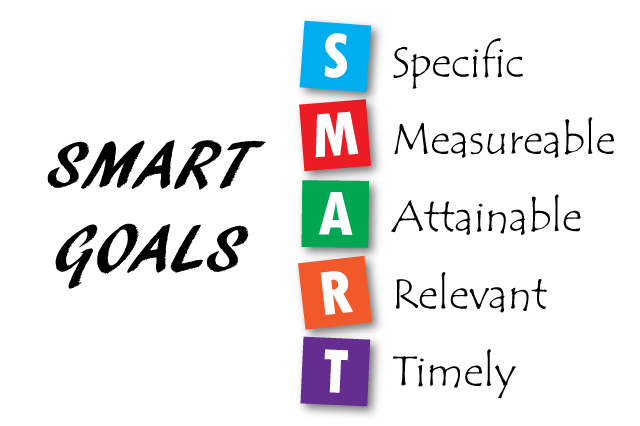Goal setting is a very important skill in order for athletes to optimize performance. All good athletes set goals and develop targets and plans to achieve their goals. Effective goal setting comes from making your goals positive, specific, actionable and flexible. The goals also need to focus on what is important and involve short and long-term goals. One way to evaluate a goal is to match it to the SMART principle.
S.M.A.R.T. Goals
If you have set a goal, take a moment to evaluate how SMART your goal is. If your goal doesn't meet these criteria, consider revising it so that it does.

Specific
For example, if your goal is to "get in better shape," consider picking a more specific goal such as "be able to walk four miles in an hour." If your goal is to improve your health, consider a more measurable goal that's appropriate to your needs, such as lowering your cholesterol by 10 points.
Measurable
An important part of setting goals is to evaluate them regularly and reset them if required. How do you know if you have achieved your goal if you can't measure it? Rather than saying you want to improve your free-throw scoring percentage, set a measurable target of 80%. Also having smaller targets on the way to your major goal can make sure you're on the right track.
Achievable
Be honest with yourself about your fitness and skill level. A key reason that goals fail is that athletes and coaches are unrealistic about what they can accomplish. For a starting runner, rather than setting a big goal like running a 10k race, set a smaller, more achievable goal such as walking a 5k race. You don't have to have lofty goals. Even small changes in your diet, lifestyle, and activity level can have significant and lasting positive effects on your overall health and longevity. Small changes are more achievable, and also more like to succeed.
Realistic
Be realistic about the constraints of your daily life. If your schedule doesn't permit going to the gym every day, scale your goal back to two or three times a week. And remember, you can get just as much exercise at home as you can at the gym.
Timely
Set multiple short-term goals, rather than one big goal. Instead of trying to lose twenty pounds during the year, aim for losing one to two pounds per week. In addition to giving you lots of mini-successes, you can more easily monitor your progress. If you aim too high, you are setting yourself up for failure.
Related Pages
- Goal Setting Strategies — once you've set your goal, you need success strategies to help you reach it.
- Goal Setting Quotes
- Information about Motivation


 Current Events
Current Events